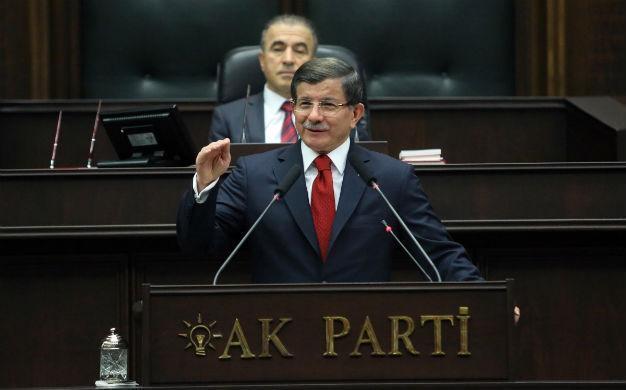Turkey backs Azerbaijan in conflict with Armenia
ANKARA

DHA photo
Turkey backs Azerbaijan in the heated conflict with Armenia over Nagorno-Karabakh, where a cease-fire has been reached after four days of clashes, with Turkish president and prime minister expressing their vociferous support for Baku.
Turkish Prime Minister Ahmet Davutoğlu echoed President Recep Tayyip Erdoğan in displaying solidarity with Azerbaijan over Karabakh, pledging to stand by Baku “until doomsday.”
“I express my condolences to all Azeris ... over the deaths of Azeri citizens resulting from Armenian attacks,” Davutoğlu said April 5, noting that he had called Azerbaijani President İlham Aliyev.
Azerbaijan said 16 Azeri servicemen had been killed in fighting around the Armenian-backed region in two days, as the decades-old conflict flared-up.
“The whole world needs to know that Turkey will stand shoulder-to-shoulder with Azerbaijan against Armenia’s aggression and occupation until doomsday,” Davutoğlu promised while addressing a parliamentary group meeting of his ruling Justice and Development Party (AKP).
Azerbaijan and Armenia fought a war over the mountainous territory, whose population are mostly ethnic Armenian, in the early 1990s in which thousands were killed on both sides, and hundreds of thousands displaced.
The region was seized by Armenian rebels from Azerbaijan in a war that ended with an inconclusive truce in 1994. The territory is now ruled by Armenia-backed separatist authorities who claim independence and are backed by Yerevan but are not recognized by any state.
“Each martyr that dear Azerbaijan has lost is our beloved one and our heart,” Davutoğlu said. “We, as 78 million [people of Turkey], will continue standing by Azerbaijan until all territories of Azerbaijan which are under occupation are rescued.”
One day prior to Davutoğlu’s remarks, Erdoğan predicted that Azerbaijan would “one day” regain control of Nagorno-Karabakh.
“We are today standing side-by-side with our brothers in Azerbaijan. But this persecution will not continue forever. Karabakh will one day return to its original owner. It will be Azerbaijan’s,” Erdoğan said at a press conference on April 4.
Ankara has no diplomatic relations with Armenia due to the dispute over the mass killings of Armenians in the Ottoman Empire, which Yerevan regards as genocide.
Truce reached, say fighters
Azerbaijan and Armenian separatists in Nagorno-Karabakh on April 5 said they had halted fighting after four days of bloodshed, as international powers scramble to resolve the worst violence in decades over the disputed region.
Armenian and Azeri forces said they had agreed a cease-fire deal after clashes since April 1 left at least 64 people dead and sparked international pressure to halt the violence.
“Military actions were halted as of 12 p.m. local time on Tuesday [April 5],” Azerbaijan’s Defense Ministry said in a statement.
Meanwhile the Defense Ministry spokesman of Karabakh told AFP that “an order was given to stop shooting.”
Azerbaijan had issued a statement on April 3 saying the country had “unilaterally suspended” their counter-attacks.
Armenian President Serzh Sargsyan said April 4 that a “cease-fire would only be possible if the militaries of both sides return to the positions” they held prior to the outbreak of hostilities.
Meanwhile, the Minsk Group of the U.S., French and Russian ambassadors to the Organization of the Security and Co-operation in Europe (OSCE) that has long mediated Karabakh peace talks, was scheduled to meet in Vienna on April 5 for talks seeking a diplomatic solution to the crisis.
President Vladimir Putin of Russia, which has sold weaponry to both sides but has far closer economic and military ties to Armenia, has called for a cease-fire, a move echoed by Washington.
Russian Foreign Minister Sergei Lavrov and U.S. Secretary of State John Kerry discussed Karabakh in a phone conversation on April 4, Russia’s Foreign Ministry said, which was also confirmed by U.S. State Department spokesman Mark Toner during a daily press briefing.
Lavrov also talked to Walter Steinmeier, the foreign minister of Germany, which holds the current presidency of the OSCE.
